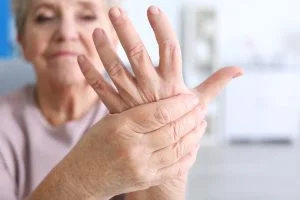Carpal tunnel syndrome is a painful condition that many people fear. It seems like an inevitable and lifelong ailment that is unavoidable. Carpal tunnel syndrome, however, may not be what you think it is.
While carpal tunnel syndrome can cause permanent nerve damage if severe enough and left untreated, many cases of carpal tunnel syndrome clear up on their own or can be treated.
So, what causes carpal tunnel syndrome, and what factors affect it?
Cause of Carpal Tunnel Syndrome
The cause of carpal tunnel syndrome can be traced to pressure on the nerve that runs down your arm, between your radius and ulna, and up the palm of your hand. It mainly connects to your thumb and first two fingers but extends into your ring finger.
The carpal tunnel is a small tube that sits on the inside of the wrist where nerves and tendons pass through. Inflammation and swelling in this area put pressure on the nerve and cause pain and numbness. It can also restrict blood flow if the swelling Is severe enough.
While the direct cause of carpal tunnel syndrome is swelling, many contributing factors can cause the swelling.
Contributing Factors
The cause of the swelling in carpal tunnel syndrome varies from person to person. The intensity of it can be determined by your health problems and the actual anatomy of your wrist. If you have a narrower passageway, to begin with, it doesn’t take much swelling to put pressure on your nerves.
Medical problems that can contribute to or cause the initial swelling include:
- Wrist fractures or trauma
- High blood pressure
- Fluid retention
- Diabetes
- Thyroid dysfunction
- Autoimmune disorders like rheumatoid arthritis.
- Lymphedema
- Kidney failure
- Obesity
Menopause and pregnancy, while not medical conditions, may also cause swelling and water retention that can cause carpal tunnel syndrome.
Risk Factors
In addition to having existing medical conditions, some factors may increase your risk of acquiring carpal tunnel syndrome. These risk factors include:
- Sex – females have a higher tendency to develop carpal tunnel syndrome
- Medication – some medications have been linked to carpal tunnel
- Employment – while there are many studies, none have yet to find a definite link between types of employment and carpal tunnel syndrome. There is, however, a more significant association with carpal tunnel syndrome and people who work in construction or with computers than most other jobs.
Exacerbating Factors
Exacerbating factors are things that you should avoid to prevent carpal tunnel syndrome from getting worse. These factors include things that will increase swelling and further irritate the nerve. Some factors that will exacerbate carpal tunnel syndrome include:
- Wrist positioning – There are studies linking mouse use and keyboard use to carpal tunnel syndrome but nothing definitive.
- Excessive exposure to vibrations – Power tools such as jackhammers are linked to the development or worsening of carpal tunnel syndrome.
- Repetitive movements that overextend your wrist – this can include assembly line jobs, instruments like piano, and drawing.
Let Mid-County Physical Therapy Treat Your Carpal Tunnel
No matter the cause of your carpal tunnel, physical therapy may be able to help. Call Mid-County Physical Therapy today to schedule a consultation on how we can help you!


